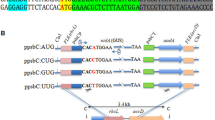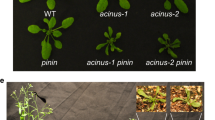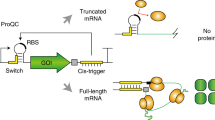Abstract
The cotyledons of developing bean (Phaseolus vulgaris L.) seeds rapidly synthesize and accumulate the storage globulin, phaseolin1, which seems to be encoded as a small multigene family2,3. Phaseolin from the cultivar ‘Tendergreen’ has been resolved electrophoretically into three components (of differing molecular weights), designated α (51,000), β (48,000) and γ (45,500). The in vitro synthesis of phaseolin has been investigated previously using a cell-free translation system derived from wheat germ4. The in vitro products did not co-migrate with the authentic polypeptides, the differences apparently being due to the lack of glycosylation of the primary transcripts. We have now used Xenopus oocytes to translate mRNA from bean cotyledons and find that phaseolin is synthesized in a glycosylated form very similar to authentic phaseolin and is transported into the membrane fraction of the cells.
This is a preview of subscription content, access via your institution
Access options
Subscribe to this journal
Receive 51 print issues and online access
$199.00 per year
only $3.90 per issue
Buy this article
- Purchase on Springer Link
- Instant access to full article PDF
Prices may be subject to local taxes which are calculated during checkout
Similar content being viewed by others
References
Sun, S. M., Mutschler, M. A., Bliss, F. A. & Hall, T. C. Pl. Physiol., Wash. 61, 918–923 (1978).
Sun, S. M., Slightom, J. L. & Hall, T. C. Nature 289, 37–41 (1981).
Brown, J. W. S., Bliss, F. A. & Hall, T. C. Theor. appl. Genet. (in the press).
Hall, T. C. et al. Proc. natn. Acad. Sci. U.S.A. 75, 3196–3200 (1978).
Cleveland, D. W., Fisher, S. G., Kirschner, M. W. & Laemmli, U. K. J. biol. Chem. 252, 1102–1106 (1977).
Ma, Y., Bliss, F. A. & Hall, T. C. Pl. Physiol., Wash. 66, 897–902 (1980).
Hall, T. C., McLeester, R. C. & Bliss, F. A. Pl. Physiol., Wash. 59, 1122–1124 (1977).
Colman, A. et al. Eur. J. Biochem. 113, 339–348 (1981).
O'Farrell, P. H. J. biol. Chem. 250, 4007–4021 (1975).
Brown, J. W. S., Ma, Y., Bliss, F. A. & Hall, T. C. Theor. appl. Genet. 59, 83–88 (1981).
Brown, J. W. S., Osborn, T. C., Bliss, F. A. & Hall, T. C. Theor. appl. Genet. (in the press).
Bollini, R. & Chrispeels, M. J. Planta 146, 487–501 (1979).
Deacon, N. & Ebringer, A. FEBS Lett. 79, 191–194 (1977).
Larkins, B. A., Pedersen, K., Handa, A. K., Hurkman, W. J. & Smith, L. D. Proc. natn. Acad. Sci. U.S.A. 76, 6448–6452 (1979).
Gurdon, J. J. Embryol. 36, 523–540 (1976).
Chamberlain, J. P. Analyt. Biochem. 98, 132–135 (1979).
Author information
Authors and Affiliations
Rights and permissions
About this article
Cite this article
Matthews, J., Brown, J. & Hall, T. Phaseolin mRNA is translated to yield glycosylated polypeptides in Xenopus oocytes. Nature 294, 175–176 (1981). https://doi.org/10.1038/294175a0
Received:
Accepted:
Issue Date:
DOI: https://doi.org/10.1038/294175a0
This article is cited by
-
Xenopus oocytes as a heterologous expression system for plant proteins
Molecular Biotechnology (1995)
-
The role of ion channels in plant nutrition and prospects for their genetic manipulation
Plant and Soil (1992)
-
Expression, glycosylation and secretion of phaseolin in a baculovirus system
Plant Molecular Biology (1988)
-
Efficient Transformation of Alfalfa Protoplasts by the Intranuclear Microinjection of Ti Plasmids
Bio/Technology (1986)
-
The use of immunochemical techniques to study plant proteins
Plant Molecular Biology Reporter (1985)
Comments
By submitting a comment you agree to abide by our Terms and Community Guidelines. If you find something abusive or that does not comply with our terms or guidelines please flag it as inappropriate.



